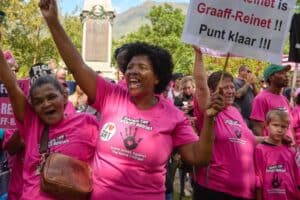Talks with municipal unions have collapsed, which led to angry employees descending on Tshwane House and causing havoc.

Municipal workers went on the rampage on Tuesday, trashing Tshwane metro headquarters after wage talks collapsed.
The protesting members of South African Municipal Workers Union (Samwu) broke into Tshwane House in Madiba Street and damaged the municipality’s head office.
Tshwane head administrator Mpho Nawa said the members entered Tshwane House, emptied wheelie bins and trashed the CBD streets with litter.
He strongly condemned the “appalling behaviour” by the protesting workers.
“The right to strike is entrenched in the constitution but no one has the right to damage the property of the municipality and trash the streets with litter. This behaviour borders on criminality.
“We hope that the police will do their job and bring to book the responsible culprits,” Nawa said.
On Tuesday, a special local labour forum meeting was held between the administrators and the representatives of both Samwu and another union, Imatu.
Nawa said the purpose of the meeting was to conclude the two agenda items of which one was the implementation of the 6.25% annual wage increase and implementation of the benchmarking collective agreement.
“These items had not been concluded from the previous meeting held on Thursday, last week.”
He said the talks were not concluded due to the fact that Samwu leadership walked out of the meeting which led to its collapse as there was no quorum.
- Service delivery to be impacted as protesting workers trash Tshwane headquarters. Photo: Supplied
- Service delivery to be impacted as protesting workers trash Tshwane headquarters. Photo: Tshwane metro
- Service delivery to be impacted as protesting workers trash Tshwane headquarters. Photo: Tshwane metro
- Service delivery to be impacted as protesting workers trash Tshwane headquarters. Photo: Tshwane metro
“The main issue that was disputed by leaders of both unions was around the metro’s request to make a proposal on how the 6.25% pay rise could be structured.”
Nawa said the administrators had also made a compelling case regarding the state of the metro’s finances.
He said national treasury had also raised this concern of finances with the Tshwane metro.
“It is public knowledge that over the passage of time, the city’s revenue has been declining and this problem was compounded by under-collection due to the Covid-19 pandemic.
“These challenges were not only pervasive to the Tshwane metro, as all sectors of our economy are bleeding as a result of coronavirus pandemic.”
A summary of the metro’s finances are as follows:
- Actual average collection for April to June 2020, was 68%.
- This equals a loss of income for the three months, of more than R2.8 billion.
- The revenue in the budget is earned and cash collected during the year – the amount shown as revenue is not available in cash at the beginning of the year.
- Employee costs increased from 30% of operational expenditure to 31.5% of operational expenditure in the 2020/2021 financial year.
- In the 2020/2021 budget, R931 million (12%) had to be cut from materials, contracted services, transfers, and general expenditure.
Nawa said due to the loss of revenue, service delivery would also be impacted.
“Our projections indicate that if nothing changes, the metro is likely to have a shortfall of R5 billion by the end of the 2020/21 financial year, thus running a risk of not being able to honour its financial obligations, including salaries.
“It is against this background, that the administrators took a conscious decision that while they appreciate the currently existing agreements, however, they cannot be reckless and make decisions that could bankrupt the metro.”
He said since the administrator’s arrival in the metro, a clarion call had constantly been made to all employees to redirect their energies towards serving the people of Tshwane.
Nawa said the metro remained committed to honouring the collective agreement within the affordability limits.
“As we continue with our negotiations with union leadership, we call upon all employees to have a full appreciation of the financial challenges the metro finds itself in.
“As administrators, we want to see our employees happy, employed and avoid future retrenchments.”
He said the metro’s position to honour 6.25%-wage increment remained on the table.
“We have not reneged on this commitment that we have communicated to union leadership.
“With regards to the implementation of the benchmarking collective agreement, we have stated in the meeting that, as we deal with the 6.25%-wage increment, the metro is not in a position to even begin engaging with labour on this matter.”
Nawa has called upon all leaders “to be sensitive to these prevailing realities”.
“We, therefore, appeal to both union leadership, to come back to the boardroom so that we can resolve all the outstanding issues without compromising service delivery and most importantly, the lives of our employees when our metro is engulfed by the Covid-19 storm.”
He said the metro would continue exploring and implementing all measures to ensure that it improved their revenue collection as part of the long-term agenda of building a financially sustainable metro.
This article first appeared on Rekord East and was republished with permission.
For more news your way, download The Citizen’s app for iOS and Android.
Support Local Journalism
Add The Citizen as a Preferred Source on Google and follow us on Google News to see more of our trusted reporting in Google News and Top Stories.










